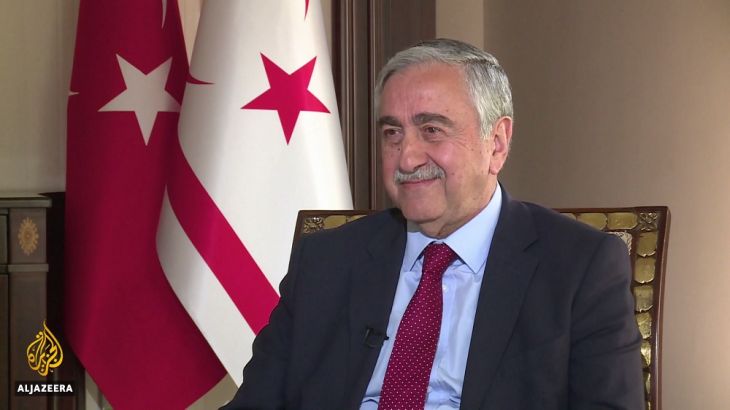
Akinci: Greek Cypriots all talk and no action on reunification
Turkish Cypriot leader says ‘accidents can happen at any time’ amid gas dispute, and resolution is increasingly complex.
Turkish Cypriot leader Mustafa Akinci’s election in 2015 reinvigorated hopes for a solution to the Cyprus problem.
Campaigning on a promise to restart stalled negotiations with the Greek Cypriot government, Akinci seemed primed to breathe new life into attempts to resolve the decades-long dispute on the Mediterranean island.
”It’s
‘hope dies last’, but you have to work hard and you have to work to keep it alive because otherwise, just letting time pass, you kill it.”]
Soon after the election, Akinci and Greek Cypriot President Nicos Anastasiades entered into reunification negotiations with the support of the United Nations at Crans-Montana, Switzerland.
Three years later, the talks are almost a distant memory, having fallen apart in July 2017, and tensions are running high over the issue of gas exploration off Cyprus. Akinci says that the responsibility for the lack of progress lies with the Greek Cypriot government.
“They are always ready for talks, but they are not ready for taking decisions,” he tells Al Jazeera. “Of course, if we want to solve the problem, we need to talk but, at some point, we need to take decisions.”
“I need to see some indication that the mentality has changed … in addition to that we need to have negotiations at some point, but not business as usual, not to go around the issues all the time without any results, it has to be result-orientated.”
Effectively divided along ethnic lines since 1974, when the Turkish military intervened in response to an Athens-inspired coup, the Republic of Cyprus is recognised by the international community and became a member of the European Union in 2004.
The majority of the island is controlled by a Greek Cypriot government under the recently re-elected Anastasiades, who discussed reunification and the current gas dispute with Al Jazeera earlier this month.
The northern part of the island, however, is ruled by the government of the self-declared Northern Cyprus under Akinci, which is recognised by Turkey and guarded by its armed forces.
On the recent controversy surrounding gas exploration around Cyprus, Akinci is positive about the shared benefits drilling could bring. But he cautions that, with so many actors involved in the gas exploration – US energy giant ExxonMobil has been given permission by Greek Cypriots to begin explorations and Akinci confirmed to having agreements with Turkish firms – there is strong potential for an accidental confrontation.
“I cannot say that everything is fine and everything will be under control, sometimes certain things happen unwillingly and accidentally … I see a big opportunity there, if treated properly, handled properly, without any fear of accidents [ourselves] and the others we can get mutual benefit out of it … If not handled properly, you may expect accidents at any time.”
While still insisting on his commitment to finding a mutually satisfactory resolution to the Cyprus problem, the Turkish Cypriot leader, who, at 70 is part of the last generation that remembers living in an undivided Cyprus, acknowledges that it’s not an easy task.
“It’s getting more and more difficult and more and more complex. There is a nice [phrase] ‘hope dies last’, but you have to work hard and you have to work to keep it alive because otherwise, just letting time pass, you kill it.”